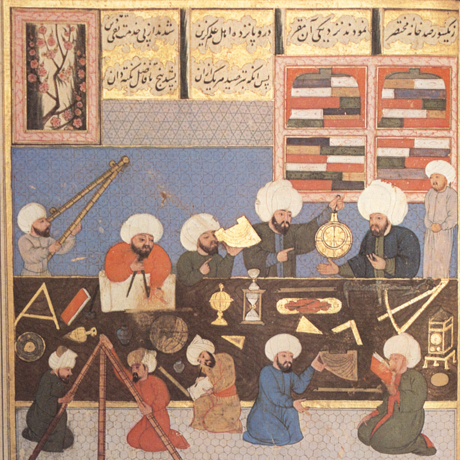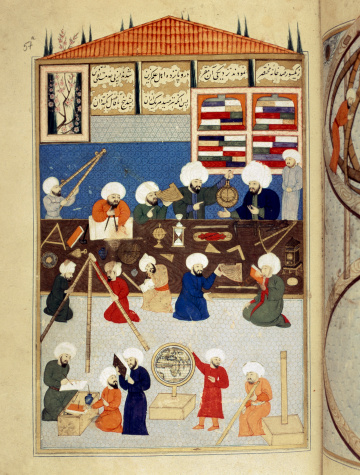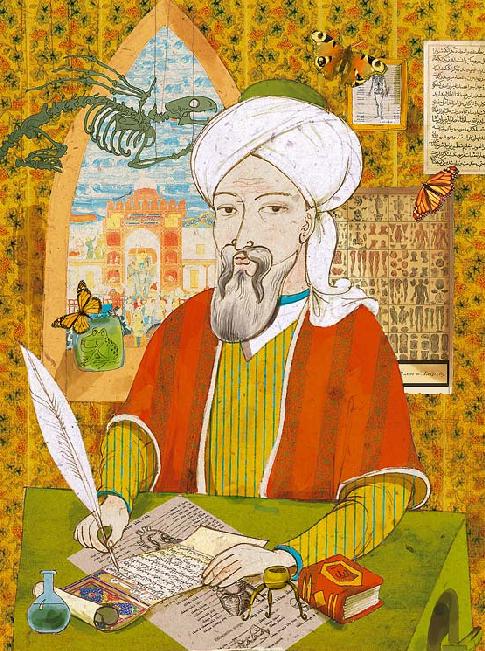
In this notable book The Truth of Islamic Culture[1] Shaykh Nasir ibn Hamad al-Fahd, a contemporary Islamist, proposes a view on the explosion of science following the era of the awakening. The book is in four parts and treats with Islamic culture and the concept of science and offers an opinion on the scholars of the awakening period and finally a rebuttal of points of contention.
SHAYKH NASIR AL-FAHD propounds in this way his rejection of science and scientists and his reliance instead on the legacy of Islamic thought, along the work subsequent to the awakening which accumulated uncritically as if they were sanctified texts. The value of this book is in its demonstration of the position taken by the religious mindset on science and scientists subsequent to the awakening and one which has prevailed over Arab and Islamic societies. Many contemporary Muslims seem unaware of this position, yet it continues to wield its influence over thinking and over the standpoint on science.
In any case, one may ascertain through the book that science was under attack during the period of regression from two sides:
Firstly: the period of the classical Islamic Caliphate is held to be the apogee of civilisation in all its aspects. Thus, the sciences which modern scholars handled (that is, in the age of the awakening) subsequently is of no value or importance, due to its non-existence in the days of the Caliphate. He sees in the first section that
True Islamic culture is that which is to be found in the best centuries, during the time of the Companions and those who came immediately after them, and the imams of faith … those who attained to the highest in knowledge and science and influence, beyond which there is nothing to see nor anything to add. The conquered lands, built up their strongholds, nations submitted to them and peoples crumbled before them. You should therefore be aware that the true faith is that which the Predecessors established, science is limited to what they found of use, and anything aside from this has nothing of any value to it.
From this book it becomes clear that the period intended by ‘the preferred centuries’ is the period that predates the scientific awakening, that is prior to the eighth century. On the basis of this view there is no importance to be given to the awakening or to any subsequent developments in Muslim history!
On the basis of Ibn Taymiyya’s view the natural sciences are an evil that is to be shunned
Secondly: the sciences are of two types. There are the mundane sciences or the sciences of the ancients, what we now refer to as the natural sciences (chemistry, mechanics, mathematics, biology and astronomy). The author states that
these sciences, termed the sciences of the ancients, did not become disseminated among the Muslims and only appear to any major degree in the time of the Caliph Al-Ma’mūn (786-833) who ordered the translation of Greek books on philosophy and wisdom and so on. By so doing he caused evil to enter among the Muslims.
The other type of sciences are the religious, legal sciences, which are held to be the fundamental, important sciences. These the author categorizes as
the knowledge of Law, as indicated by the Qur’ān and the Sunna and the words of the Predecessors, not the sciences of the philosophers and the atheists.
The book reiterates many of the views of the Shaykh al-Islam Ibn Taymiyya (1263-1328) and we shall provide examples of some of them below. There can be no doubt as to the great influence of Ibn Taymiyya and al-Ghazali and others upon the way society predominantly thought at the time, and still think to today. Concerning Al-Ma’mūn and his major role in the promotion of translation, of science and speculation, Ibn Taymiyya states:
God will not forgive Al-Ma’mūn for what he brought among the Muslims by translating these books.
On the basis of this view the natural sciences are an evil that is to be shunned.
It was the natural sciences that were rejected, and not just philosophy upon which al-Ghazali had waged his war. Ibn Taymiyya sees the following in the philosophers:
These philosophizers sought out those who were the furthest removed from reason and the faith, such as the Qarmatians[2]and the Bātinīs[3], who concocted their doctrine out of Greek philosophy and the religion of the Magi (Zoroastrianism) and overtly demonstrated their rejection.
Ibn al-Athir provides for us a picture of the cultural situation in the last 30 years of the third hijri century resulting from the standpoint of enmity to philosophy and the struggle against philosophical thinking:
He forced the copyists to swear that they would not take on the copying of any books of philosophy. One of the results of this was the copyists’ abandonment of their profession.[4] The date of this event points to the time of the rise of the Ash‘arite tendency, while the copyists’ abandonment of their profession as a result of this incident indicates that philosophical thinking had expanded to such an extent that when the copyists were prevented from copying books of philosophy it led to the paralyzing of the copyists’ craft. This indicates that these were the books in greatest demand at the time. [5]
On chemistry Ibn Taymiyya has this to say:
The truth about chemistry is that it attempts to emulate creation. This is wrong-headedness. For there is none like unto God … and the practitioners of chemistry are the most fraudulent of people. That is why they do not show to those with whom they interact that what they are practising is chemistry … and is forbidden by the Sharī‘a. Indeed they actively seek out what is shameful and evil … none of the Prophets, nor religious scholars, nor Muslim shaykhs, nor the Companions or those who immediately followed them ever looked kindly on the practitioners of chemistry.
As for astronomy, Ibn Taymiyya states:
Stars are of two types, astronomy and astrology. Astronomy is the knowledge of the number of the celestial spheres and the planets, their attributes and extent of their movements and what results from these. This is fundamentally a sound science in which there is nothing dubious, such as the knowledge of the world, how it was created and suchlike. But the mass of precision measurement in all this amounts to much effort for little benefit. Such is the work of the scientist of the quantities of minutes, seconds and thirds in the confusing movements of the seven wandering stars … As for astrology, it is a type of sorcery…
As for the scholars of the awakening that contemporary Muslims crow about, whose scientific efforts were revealed only by Orientalists, the intelligentsia of the Muslim world following the awakening looked upon them in a way the exact opposite of how contemporary Muslims see them. As an example we may cite some of the opinions concerning them – for more of the same the reader need only consult the book by Shaykh al-Fahd.
Ibn Taymiyya sees Ibn al-Haytham as
one of the atheists beyond the pale of Islamic faith, one of the peers of Ibn Sina in science, triviality, atheism and error. He was one of the Zindīq ‘Ubaydīs, and philosophers like him, talking of the deep antiquity of the earth and other suchlike sacrileges.[6]
As for Al-Khwarizmi (780-850 AD), whose name is familiar to modern mathematical studies and academies in all parts of the world, Ibn Taymiyyah responded to his achievements in mathematics, saying:
“although he is correct, the legal sciences are independent of him and others” (Majmoo’ Fatwas: 9/214-215). .
Ibn Sina (980-1037), known in the West as Avicenna and considered to be one of the most important thinkers and scholars in Islamic culture with an influence over western philosophers,[7] is referred to in the following manner by Islamist thinkers (these are some basic examples):
Ibn Taymiyya: “He (Ibn Sina) and his household and followers were known as atheists by the Muslims” (Refutation of the Logicians, p.141)
Ibn Qayyim al-Jawziyya (1292-1349): “The chief of the atheists and those that disbelieve in God, His angels, His books, His Prophets and the Day of Resurrection” (Aid for the Grieving, II,374)
A number of sources concur that Ibn Sina is the “chief of the atheists, of philosophical creed, both an errant one and a seducer into error, a Bātinī Qarmatī – both he and his father being Ismā‘īlī propagandists – a disbeliever in God, His angels, His books, His Prophets and the Day of Resurrection.” As for non-Muslim scholars, these were rejected summarily.
Such was the timbre of Islamic thought that prevailed from the 12th to the 20th centuries, and still predominates. Islam was the faith governing society before, during and after the awakening, and it was Islam that at the hands of the Muslim thinkers (the Mu‘tazila) led to this awakening, while at the hands of other Muslim thinkers and a different intellectual model, a scientific regression took place. Is it the faith therefore that is responsible, or the intellectuals?
Natural sciences are a force for culture, not an intellectual luxury
Natural sciences are a force for culture, not an intellectual luxury, nor are they merely inventions and discoveries to be studied, but rather free speculation that when applied examines and develops things that really exist. The strength of a nation today is in its ability to confront challenges, whether these be natural, social or political … no other force can face up to the challenges than science and technology. Anyone who lives on this planet is obligated to work within its laws, otherwise he has no place in it.
[1] Nāsir ibn Hamad al-Fahd, حقيقة الحضارة الاسلامية http://www.tawhed.ws/r?i=008j8m2r . Retrieved 2011-12-22.
[2] The Qarmatians (al-Qarāmita) were a Shī‘a Isma’īlī group dominant in eastern Arabia, particularly Bahrain. Where in 899 AD they attempted to establish a utopian republic, a society based on reason and equality and the sharing of property. They considered the pilgrimage to Mecca a superstition and in 930 sacked Medina and Mecca, from whose Kaaba they stole the Black Stone and desecrated of the Well of Zamzam with Muslim corpses. They were defeated and severely reduced by the Abbasids in 976. (Ed.)
[3] The term bātinī means ‘esoteric’ and is used, often with a pejorative slant, to refer to groups such as the Alawis, Isma’ilis and Sufis, all of whom seek, when interpreting the Qur’ān, to make a distinction between an inner bātinī level of meaning and an external (zāhirī), exoteric level of meaning. (Ed.)
[4] Ibn al-Athīr al-Jazarī, الكامل في التاريخ , Leiden 1836-1851. Al-Azhariyya 1301 AH, ‘Abd al-Wahhāb al-Najjār 1348 AH, Part II, p162.
[5] حسين مروة – النزعات المادية في الفلسفة العربية الاسلامية – 1978 دار الفارابي – بيروت– ص 54
[6]. فتاوى شيخ الإسلام: 35/135، درء التعارض: 2/281، الحاديات في مذكراته – في تاريخ الفلاسفة ص 270
[7] Sarton, G., Introduction to the History of Science (3 v. in 5), Carnegie Institution of Washington, 1931 Publication no. 376. Baltimore and “The Internet Encyclopedia of Philosophy, Avicenna/Ibn Sina (CA. 980-1037)” Iep.utm.edu. 2006-01-06.




